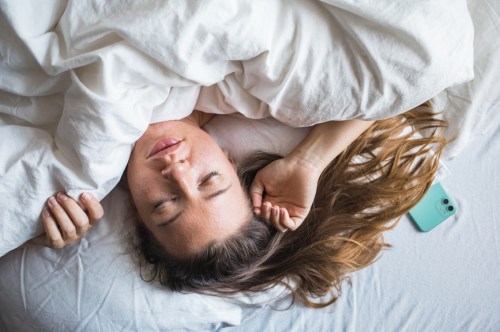Our editors independently select these products. Making a purchase through our links may earn Well+Good a commission
Yep, It’s a Thing To Snore After Drinking Alcohol—Here’s What To Know and How To Stop
Drinking alcohol can cause or worsen snoring primarily because of the ways in which alcohol relaxes the muscles in the throat.

If you’ve ever had a couple boozy drinks and conked out as soon as your head hit the pillow, you’re familiar with alcohol’s powers as a sedative or depressant. But once you doze off after a night of drinking, the physiology of alcohol and sleep don’t mix quite as seamlessly: That same relaxant property of alcohol that leads you to sleep can also cause snoring (or worsen it in folks who already snore) by triggering changes in the throat, according to sleep doctors. And that’s no good for your sleep health—or that of any bedmates, for that matter.
Experts in This Article
clinical psychologist, sleep specialist, author of The Women’s Guide To Overcoming Insomnia, and Director of Sleep Health at Sleepopolis
sleep expert and senior behavioral and social scientist at RAND Corporation
Though several conditions can cause snoring, it’s primarily the result of air not being able to flow freely through the mouth or nose. And that’s where alcohol’s depressant quality comes into play: “Alcohol causes the upper airway to relax, including the muscles in the throat,” says sleep-medicine specialist Wendy Troxel, PhD, senior behavioral scientist at the public policy research organization RAND Corporation and author of Sharing the Covers: Every Couple’s Guide to Better Sleep.
“Alcohol causes the upper airway to relax, including the muscles in the throat.” —Wendy Troxel, PhD, sleep-medicine specialist
Because the throat muscles are already a little lax at nighttime, the additional loosening prompted by alcohol can really restrict airflow; the air you breathe essentially has to force its way through those floppy muscle tissues, which vibrate against each other in the characteristic rumbles of snoring. That effect is cumulative, too: “The more you drink, the more those muscles are going to relax, leading to more and louder snoring,” says Dr. Troxel.
And that’s not the only connection between alcohol and snoring, according to sleep specialist Shelby Harris, PsyD, author of The Women’s Guide to Overcoming Insomnia: “Because alcohol can lead to swelling of the tissue in the nose, it can cause some people to become more congested, creating more of a need to breathe through the mouth.” That tendency to mouth-breathe at night can worsen the intensity of snoring, too, as can dehydration, which alcohol can cause, as well, adds Dr. Troxel.
What you need to know if alcohol causes you to snore (or snore louder than usual)
Snoring might seem pretty innocuous (albeit, annoying to any bedmates or roommates). But because it can disrupt your sleep, cause gaps in breathing, or even wake you up in the case of a particularly powerful vibration, it can lead to poor sleep quality over time.
Since snoring is also a primary symptom of obstructive sleep apnea (OSA)—a breathing disorder that causes short lapses in breathing throughout the night—both doctors suggest getting a sleep-apnea screening if the snoring you’re experiencing from alcohol is particularly intense, or if you’re waking up feeling unrested, even after sleeping for several hours post-drinking. (After all, sleep apnea goes undiagnosed all too often and can lead to heart-health issues down the line if it’s left untreated.)
How to mitigate the effects of alcohol on snoring
Unsurprisingly, the number-one way to limit snoring post-drinking is to drink less. And it’s worth noting, this could have other benefits for your sleep quality, too, given that alcohol is also known “to fragment sleep and specifically disrupt rapid-eye-movement (REM) sleep, which is a critical stage of sleep associated with learning, memory consolidation, and emotional processing,” says Dr. Troxel.
Beyond drinking less, though, you can also aim to cut off any alcohol consumption at no later than three to four hours before your bedtime, says Dr. Harris, as this can reduce its effects on snoring. She also suggests alternating every alcoholic drink with a glass of water to keep yourself from becoming dehydrated (which is, as noted above, another route by which alcohol can cause snoring) and being mindful of medications you’re taking that might have a similarly sedating effect as alcohol, like many anti-anxiety medications and antihistamines. “These medications can already worsen snoring in some people, but if you combine them with alcohol, the snoring and potential sleep apnea can be even worse,” says Dr. Harris.
One last precaution? Take note of your sleeping position whenever you’re flopping into bed after a drink. “Snoring is usually worse when you’re on your back, so if you can, try to sleep on your side instead if you’ve had alcohol,” says Dr. Harris. And if that’s tough for you to do, she has a trick: Find a pocket T-shirt, sew a tennis ball into the pocket, and wear it backward to keep yourself from flipping onto your back mid-snooze.
Oh hi! You look like someone who loves free workouts, discounts for cutting-edge wellness brands, and exclusive Well+Good content. Sign up for Well+, our online community of wellness insiders, and unlock your rewards instantly.
Sign Up for Our Daily Newsletter
Get all the latest in wellness, trends, food, fitness, beauty, and more delivered right to your inbox.
Got it, you've been added to our email list.










